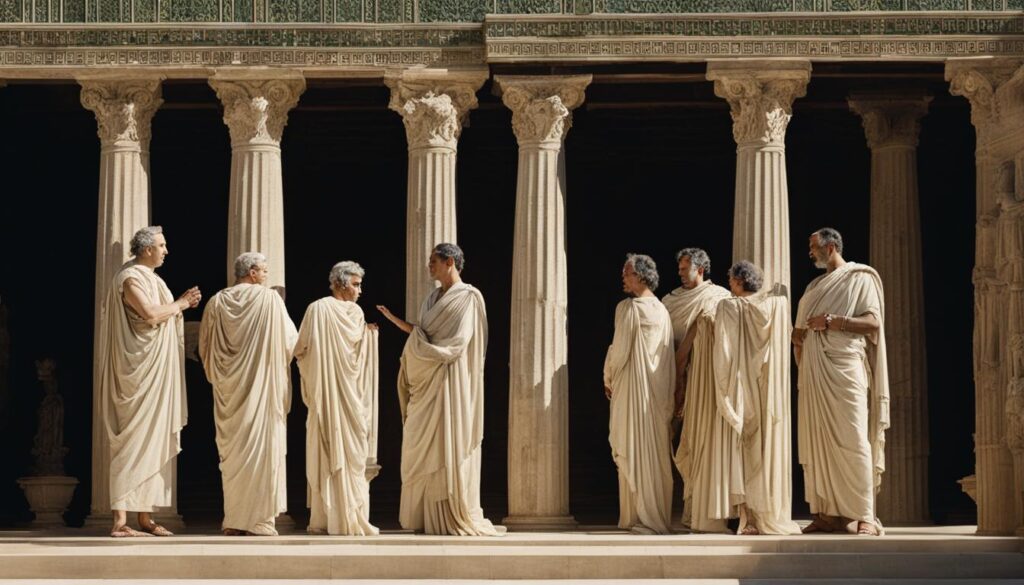Welcome to our exploration of the intriguing world of the supplication Greek word. In ancient Greece, language held immense power, and words carried deep cultural and historical significance. The term “supplication” in Greek holds a rich tapestry of meanings and emotions, offering us a glimpse into the complexities of Greek society and diplomacy.
The Greek word for supplication, “ἱκετεία” or “ἱκετεύω,” invokes a sense of humble pleading and beseeching for mercy or assistance. This act of submission to a higher authority, be it a deity or a powerful individual, was deeply woven into the fabric of Greek culture and society.
Throughout this article, we will delve into the historical roots and linguistic nuances of the supplication Greek word. From its origins in divine worship and religious practices to its role in Greek diplomatic discourse, we will uncover the profound impact of supplication on ancient Greek civilization.
Key Takeaways:
- Supplication in ancient Greek culture involved humble pleading and submission to higher authorities.
- The Greek word for supplication is “ἱκετεία” or “ἱκετεύω.”
- Supplication played a pivotal role in religious practices, seeking divine intervention and favor.
- In Greek diplomacy, supplication and negotiation were often seen as conflicting concepts.
- The linguistic significance of the supplication Greek word reflects the cultural and religious nuances of ancient Greece.
Supplication and Diplomacy: A Complex Relationship
In the world of Greek diplomacy, the concepts of supplication and negotiation were often seen as mutually exclusive. Supplication, with its aim to evoke emotions of pity, mercy, and empathy, did not align with the diplomatic ideal of balanced exchanges and reciprocity. Greek ambassadors rarely employed supplication in their diplomatic speeches, reserving it for legal or theatrical contexts instead. However, despite its limited use in diplomatic negotiations, supplication holds significance in understanding the interplay between emotions, rhetoric, and power dynamics in ancient Greece.
In Greek culture, diplomacy played a vital role in maintaining peaceful relations and resolving conflicts among city-states. The diplomatic ideal emphasized negotiation and reciprocity, where both parties exchanged concessions to reach a mutually beneficial agreement. Supplication, on the other hand, was an act of submission and a plea for mercy or intervention. While it had emotional appeal, supplication did not align with the principles of reciprocity and balanced exchanges. Instead, it relied on the power of emotions and the evocation of empathy to sway opinion and gain sympathy.
Despite its unconventional use in diplomatic negotiations, there are historical examples of supplication in Greek diplomacy. The appeal made by the Platæan ambassadors to the Spartan judges in 427 BC, as recounted by Thucydides, is one such example. These instances often relied on shared memories and past experiences to evoke emotions and gain favor. The role of emotions in Greek diplomatic discourse cannot be overlooked, as it influenced the outcome of negotiations and shaped diplomatic relations.

The Rhetoric of Supplication in Greek Diplomatic Discourse
Supplication is a powerful act that aims to evoke emotions of pity, mercy, and empathy in the supplicandus. However, in the world of Greek diplomacy, the concepts of supplication and negotiation were often seen as mutually exclusive. While diplomacy emphasizes reciprocity and negotiation, supplication is a plea for mercy and intervention. Greek ambassadors rarely employed supplication in their diplomatic speeches, as it was not conducive to the diplomatic ideal of balanced exchanges. Instead, supplication was more commonly used in legal or theatrical contexts.
Supplication and Diplomatic Negotiations in Ancient Greece
In the Greek city-states, diplomacy played a vital role in maintaining peaceful relations and resolving conflicts. The diplomatic ideal focused on negotiation and reciprocity, where both parties would exchange concessions to reach a mutually beneficial agreement. Supplication, on the other hand, was an act of submission and pleas for mercy or intervention. While supplication had emotional appeal, it was not an effective tool for diplomatic negotiations, as it did not align with the principles of reciprocity and balanced exchanges.
Examples of Supplication in Greek Diplomatic Discourse
Despite its limited use in diplomatic speeches, there are some historical examples of supplication in Greek diplomacy. One notable example is the appeal made by the Platæan ambassadors to the Spartan judges in 427 BC, as recounted by Thucydides. Another example is the speech of the Theban ambassadors in Greek literature during the time of the Peloponnesian War. These instances of supplication often relied on appeals to shared memories and past experiences to evoke emotions and gain sympathy.
Supplication and Diplomatic Negotiations in Ancient Greece
In ancient Greece, diplomatic negotiations played a crucial role in maintaining peaceful relations and resolving conflicts among city-states. The Greek diplomatic ideal focused on reciprocity and balanced exchanges, where both parties would make concessions to reach a mutually beneficial agreement. However, supplication, which involved pleading for mercy or intervention, was not considered an effective tool for diplomatic negotiations.
Supplication, with its emotional appeal, often evoked pity, mercy, and empathy. While it may have been a powerful act in other contexts, Greek ambassadors rarely employed supplication in their diplomatic speeches. Instead, they prioritized negotiation and reciprocity, adhering to the principles set forth by the diplomatic ideal.
The use of supplication in the Greek diplomatic discourse was limited due to its inherent conflict with the ideals of negotiation and reciprocity. Supplication represented a plea for mercy and submission, while diplomacy aimed at mutual concessions and balanced exchanges. As a result, Greek ambassadors sought to negotiate and reach agreements through diplomatic means rather than relying on supplication.
Through an understanding of the role of supplication in Greek diplomacy, we gain insights into the complexities of diplomatic interactions in ancient Greece. While supplication may not have been a commonly employed tool in negotiations, its historical significance highlights the interplay between emotions, rhetoric, and power dynamics in ancient Greek society and culture.

The table below provides a summary of the key differences between supplication and negotiation in Greek diplomatic discourse:
| Supplication | Negotiation |
|---|---|
| Act of pleading for mercy | Process of mutual concessions |
| Emotional appeal | Emphasis on reciprocity |
| Submission and plea for intervention | Mutually beneficial agreements |
By examining the differences between supplication and negotiation, we can appreciate the unique aspects of Greek diplomacy and the strategic approach taken by Greek ambassadors. While supplication held its place in other areas of Greek society, diplomatic negotiations were primarily driven by the desire for mutual benefit and balanced exchanges.
Examples of Supplication in Greek Diplomatic Discourse
While supplication was not commonly used in Greek diplomatic speeches, there are historical examples that showcase its presence in certain contexts. One notable example is the appeal made by the Platæan ambassadors to the Spartan judges in 427 BC, as recounted by Thucydides. The ambassadors pleaded for mercy and intervention, emphasizing their desperate situation and the need for assistance. Their supplication aimed to evoke compassion and empathy, appealing to the shared values and sense of justice among the Spartans.
“We appeal to your sense of justice and ask for your mercy. Our city is facing imminent destruction, and our people are suffering greatly. We implore you, as fellow Greeks, to extend your hand of assistance and prevent the annihilation of our beloved city. We place our fate in your hands, trusting in your wisdom and compassion.”
Another example of supplication in Greek diplomatic discourse can be found in the speeches of Theban ambassadors during the time of the Peloponnesian War. These ambassadors, representing a city often at odds with other Greek city-states, used supplication as a means to gain sympathy and support. They emphasized the historical ties and shared experiences between Thebes and their audience, appealing to emotions and memories to evoke a favorable response.
These examples demonstrate that while supplication was not a common feature of Greek diplomatic negotiations, it was employed strategically in specific circumstances. Supplication allowed ambassadors to tap into the emotions and shared memories of their audience, leveraging these connections to gain support and assistance. It serves as a reminder that even in the realm of diplomacy, the power of heartfelt pleas and emotional appeals should not be underestimated.
| Example | Year | Description |
|---|---|---|
| Platæan ambassadors appeal to Spartan judges | 427 BC | The ambassadors plead for mercy and intervention, emphasizing their desperate situation and the need for assistance. |
| Theban ambassadors during the Peloponnesian War | 5th century BC | The ambassadors use supplication to gain sympathy and support, emphasizing the historical ties and shared experiences between Thebes and their audience. |
The Role of Emotions in Greek Diplomatic Discourse
Emotions play a significant role in the realm of diplomatic negotiations, even in ancient Greece. Greek ambassadors understood the power of emotional appeal and its potential to shape diplomatic relations. While supplication, a form of emotional appeal, was not commonly employed by Greek diplomats, it is crucial to recognize its influence on the outcome of negotiations.
“Emotions have the power to sway opinion and motivate action. They can evoke feelings of pity, fear, or empathy, which are key factors in diplomatic interactions.”
Greek diplomats often relied on rhetorical techniques to evoke specific emotions in their audiences. By appealing to the emotions of their counterparts, diplomats sought to gain sympathy, understanding, and ultimately, achieve their diplomatic objectives. Although emotions alone were not sufficient to secure successful negotiations, they played a significant role in shaping the outcome.
Emotional appeal creates an opportunity for empathy and understanding between parties involved in diplomatic negotiations. By tapping into the emotional aspect of human nature, diplomats can establish a deeper connection and facilitate better communication. Consequently, this can lead to a more favorable environment for finding common ground and reaching mutually beneficial agreements.
In summary, the use of emotions in Greek diplomatic discourse demonstrates the recognition and understanding of the significant impact emotions have on negotiations. While emotional appeals, such as supplication, were not typically utilized, diplomats employed rhetorical techniques to evoke specific emotions and sway opinion. Recognizing the role of emotions in diplomatic interactions allows for a more comprehensive understanding of the complexities of ancient Greek diplomacy.
The Supplication Greek Word and its Linguistic Significance
The Greek language is rich with words that carry deep cultural and historical meaning. One such word is the Greek term for supplication, known as “ἱκετεία” (hiketeia) or “ἱκετεύω” (hiketeuo). These terms encapsulate the act of humbly pleading or begging for mercy or assistance. In the context of Greek culture, supplication was closely tied to the belief in divine intervention, where individuals would submit themselves to a higher authority, such as a deity or a powerful individual, in the hope of gaining favor or protection.
Supplication in Greek society went beyond mere words and encompassed a range of physical gestures and rituals. These acts of supplication were seen as acts of humility and submission, emphasizing the power dynamics and reverence for those being supplicated. The supplication Greek word reflects the cultural and religious practices of ancient Greece, where individuals acknowledged their vulnerability and sought divine assistance through pleas and entreaties.
The linguistic significance of the supplication Greek word sheds light on the deep-rooted cultural values and beliefs of ancient Greece. It highlights the importance of humility, submission, and the acknowledgment of one’s limitations in the pursuit of divine intervention. The term encapsulates the emotional and spiritual aspects of supplication, emphasizing the connection between the supplicant and the higher authority being supplicated. The supplication Greek word serves as a reminder of the profound influence of religion and divine belief systems on ancient Greek society and culture.
By exploring the linguistic significance of the supplication Greek word, we gain a deeper understanding of the cultural and historical context in which supplication played a prominent role. It allows us to appreciate the complex interplay between language, belief systems, and societal norms, offering valuable insights into the ancient Greek worldview and the significance they placed on supplication as a means of seeking divine favor and intervention.

The Linguistic Significance of the Supplication Greek Word
| Greek Word | English Translation | Linguistic Meaning |
|---|---|---|
| ἱκετεία (hiketeia) | Supplication | The act of humbly pleading or begging for mercy or assistance |
| ἱκετεύω (hiketeuo) | To supplicate | The act of making humble pleas or entreaties for divine intervention |
“Supplication is the language of the soul, a humble plea to the divine for mercy and assistance in times of need.”
Supplication in Greek Culture and Society
Supplication held a profound significance in ancient Greek culture and society. It was an integral part of religious practices and rituals, allowing individuals to seek divine intervention, forgiveness, or assistance. The act of supplication reflected the deep-rooted belief in the influence and power of the gods in everyday life. Ancient Greeks understood the importance of humility and submission when approaching the deities, and supplication served as a means to express these qualities.
Supplication was not limited to religious contexts alone; it also played a prominent role in Greek literature and theater. The act of humbly pleading for mercy or assistance evoked emotions and engaged the audience, making supplication a vital component of dramatic and poetic storytelling. Through supplication, authors and playwrights sought to explore themes of vulnerability, mortality, and the complex relationship between mortals and immortals.
“Supplication in ancient Greek culture was a powerful expression of the human desire for divine intervention and favor.”
Supplication in Greek culture also reflected the social and hierarchical structure of ancient Greek society. It was a way for individuals to show deference and submission to those in positions of power and authority. Supplication allowed individuals to appeal to higher-ranking individuals or rulers for mercy or intervention, acknowledging their superior status and seeking their assistance. In this way, supplication served as a means to navigate societal hierarchies and secure support or protection.
| Supplication in Greek Culture and Society | Religious Practices | Literature and Theater | Social Significance |
|---|---|---|---|
| The act of humbly pleading for divine intervention and assistance. | Included seeking forgiveness, protection, and divine guidance. | Elicited emotions and engaged the audience in dramatic and poetic storytelling. | Reflected the hierarchical structure of ancient Greek society and showed deference to those in power. |
The supplication Greek word captures the essence of this cultural and social practice, encapsulating the deep yearning for divine favor and intervention. Understanding supplication in the context of Greek culture and society allows us to appreciate the profound influence of religious beliefs, literature, and societal structures on ancient Greek interactions and beliefs.
Understanding the Supplication Greek Word in Greek Diplomatic Discourse
Supplication, a humble plea for mercy or assistance, holds historical significance in Greek diplomatic discourse. While not commonly employed by Greek ambassadors, its role cannot be overlooked. Supplication unveils the intricate interplay between emotions, rhetoric, and power dynamics in ancient Greece, shedding light on the broader context of diplomatic interactions.
In Greek society and culture, supplication played a vital role, invoking divine intervention and seeking favor from the gods. It was deeply ingrained in religious practices, where individuals would humbly supplicate for forgiveness, protection, or assistance. Furthermore, supplication featured prominently in Greek literature and theater, evoking emotions and engaging audiences. This act of humble pleading reflected beliefs in divine intervention and the importance of humility and submission.
While Greek ambassadors rarely employed supplication in their negotiations, understanding the supplication Greek word offers valuable insights. It highlights the linguistic and cultural nuances associated with this act, emphasizing its connection to religious and social practices in ancient Greece. The historical significance of supplication cannot be undermined, as it sheds light on the complex dynamics of emotions, rhetoric, and power in Greek diplomatic discourse.
FAQ
What is the meaning of the supplication Greek word?
The supplication Greek word is “ἱκετεία” (hiketeia) or “ἱκετεύω” (hiketeuo), which refers to the act of humbly pleading or begging for mercy or assistance.
How was supplication used in Greek diplomacy?
Supplication was rarely employed in Greek diplomatic speeches, as it did not align with the principles of reciprocity and balanced exchanges. It was mostly used in legal or theatrical contexts.
Are there any historical examples of supplication in Greek diplomacy?
Yes, there are historical examples of supplication in Greek diplomacy, such as the appeal made by the Platæan ambassadors to the Spartan judges in 427 BC, as recounted by Thucydides.
What was the role of emotions in Greek diplomatic discourse?
Emotions played a significant role in Greek diplomatic discourse, influencing the outcome of negotiations and shaping diplomatic relations. Greek diplomats often used rhetorical techniques to evoke specific emotions in their audiences.
What is the linguistic significance of the supplication Greek word?
The supplication Greek word highlights the cultural and religious practices of ancient Greece, where supplication played a significant role in invoking divine intervention and seeking favor from the gods.
How did supplication impact Greek culture and society?
Supplication was deeply ingrained in the cultural and social fabric of ancient Greek society. It played a pivotal role in religious practices and served as a means to evoke emotions and engage the audience in Greek literature and theater.
What is the significance of understanding the supplication Greek word in Greek diplomatic discourse?
While supplication was not commonly used in Greek diplomatic negotiations, understanding its role in Greek society and culture sheds light on the broader context of diplomatic interactions and the interplay between emotions, rhetoric, and power dynamics in ancient Greece.








